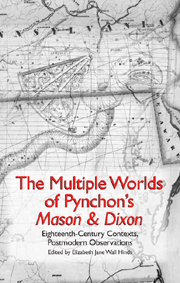 The Multiple Worlds of Pynchon's 'Mason and Dixon'
The Multiple Worlds of Pynchon's 'Mason and Dixon' from Consumption Then and Now
Published online by Cambridge University Press: 12 September 2012
STATIONED IN CAPE TOWN to observe the Transit of Venus, Charles Mason finds himself bemoaning the lack of variety to be found in Dutch Cape kitchens, a lack which has driven his partner Jeremiah Dixon to sample every available ketjap and Malay delicacy in hopes of avoiding “[t]he smell … of Mutton-fat vaporiz'd and recondens'd, again and again, working its way insidiously, over the years of cooking, into all walls, furniture, draperies …” (86). Just as this scent of cooked sheep seeps into the walls and so becomes a constant underlying presence in the Vroom household, so too does food continually reappear in Mason & Dixon as a subtle reminder of the political and social forces governing the lives of the main characters, and as suggestions of the overlap between the eighteenth and twentieth centuries. In The Empire Writes Back, Bill Ashcroft, Gareth Griffiths, and Helen Tiffin place language at the center of colonialism, claiming that “[o]ne of the main features of imperial oppression is the control over language” (7). For Ashcroft, Griffiths, and Tiffin, language becomes one of the primary sites of colonial struggle, as the restriction of language allows control over the processes of communication, granting colonists a permeating power over nearly every aspect of life in the colonies. As such, language becomes a key figure in any postcolonial expression, as the re-emergence of native voices, or the appropriation and subtle repositioning of the colonial voice, suggests the ways in which the colonized come to exercise some control over that which had been one of the primary means of their oppression, and signify difference from the colonial center (43).
To save this book to your Kindle, first ensure [email protected] is added to your Approved Personal Document E-mail List under your Personal Document Settings on the Manage Your Content and Devices page of your Amazon account. Then enter the ‘name’ part of your Kindle email address below. Find out more about saving to your Kindle.
Note you can select to save to either the @free.kindle.com or @kindle.com variations. ‘@free.kindle.com’ emails are free but can only be saved to your device when it is connected to wi-fi. ‘@kindle.com’ emails can be delivered even when you are not connected to wi-fi, but note that service fees apply.
Find out more about the Kindle Personal Document Service.
To save content items to your account, please confirm that you agree to abide by our usage policies. If this is the first time you use this feature, you will be asked to authorise Cambridge Core to connect with your account. Find out more about saving content to Dropbox.
To save content items to your account, please confirm that you agree to abide by our usage policies. If this is the first time you use this feature, you will be asked to authorise Cambridge Core to connect with your account. Find out more about saving content to Google Drive.